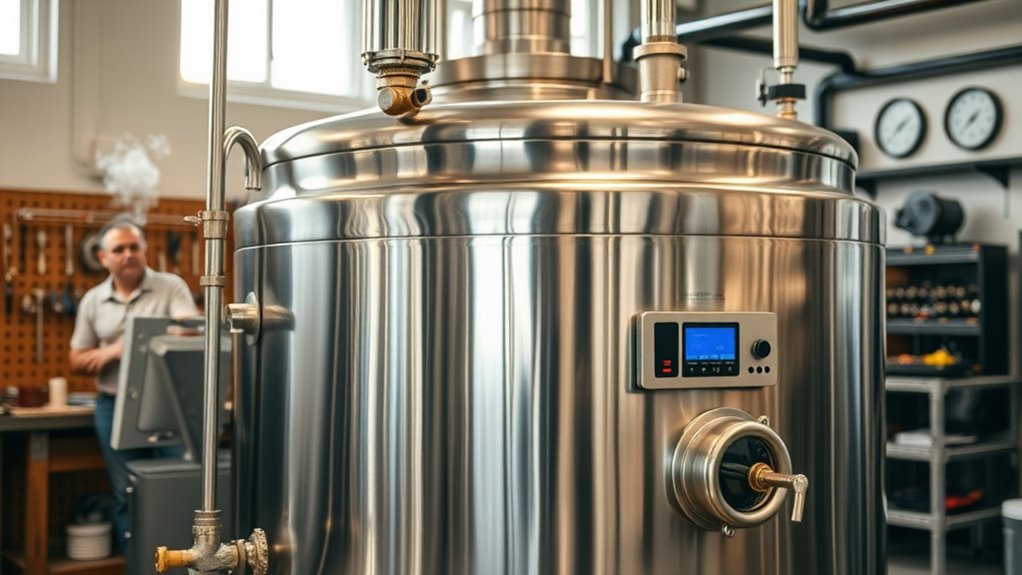When choosing a boiler for longevity, consider conventional and system boilers, which can last 15 to 20 years, and brands known for durability like Worcester Bosch's Greenstar series and Vaillant's ecoTEC Plus models. Regular maintenance plays an essential role in maximizing your boiler's lifespan and efficiency. Monitoring unique signs of wear can indicate when it's time for a replacement. Stay tuned for more tips on extending your boiler's life and enhancing its performance.
Key insights
- Worcester Bosch's Greenstar series often exceeds a lifespan of 15 years, making it one of the most durable options available.
- Vaillant's ecoTEC Plus models are designed for long-term reliability, contributing to their extended lifespan.
- Ideal's Logic+ range is backed by strong warranties and positive feedback, indicating its durability and longevity.
- Regular maintenance can significantly enhance the lifespan and performance of any boiler, optimizing its efficiency.
- Quality of materials and installation directly influence a boiler's longevity, with higher quality typically leading to longer-lasting units.
Types of Boilers and Their Lifespan
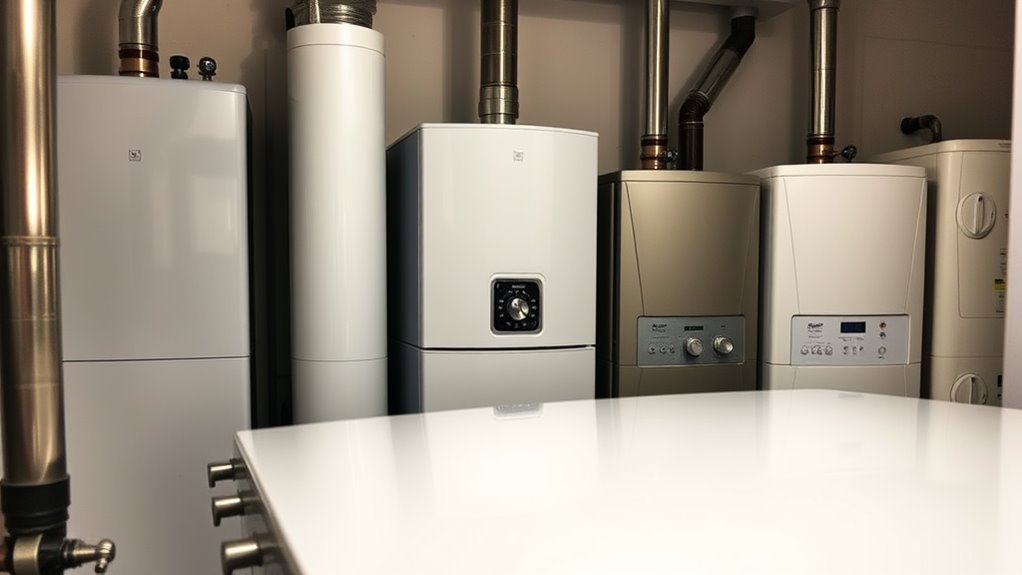
When considering the longevity of boilers, it's essential to understand the various types available and their expected lifespans. Typically, you'll encounter three main boiler types: conventional, system, and combi boilers. Conventional boilers usually last between 15 to 20 years, while system boilers tend to have a similar lifespan, often reaching around 15 years. Combi boilers, known for their efficiency, generally last about 10 to 15 years. Each boiler type has its unique components and operational mechanisms, influencing lifespan expectations. Regular maintenance is key to maximizing durability, as neglect can shorten their operational life. By selecting the right boiler type and adhering to maintenance schedules, you can enhance its longevity and guarantee reliable performance throughout its lifespan. Additionally, regular servicing is crucial for maintaining optimal performance and safety, ultimately contributing to a longer boiler life.
Factors Influencing Boiler Longevity
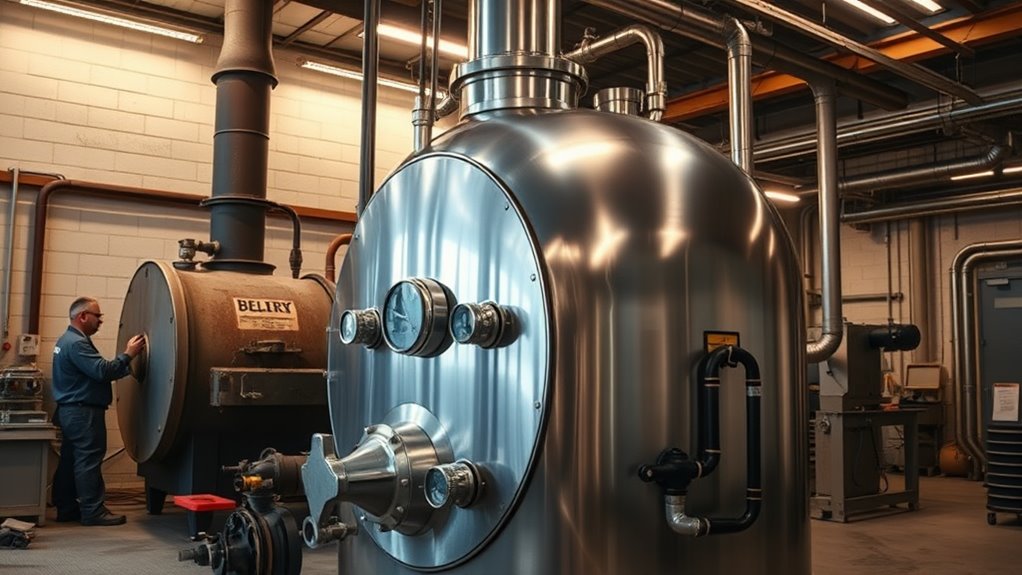
Selecting the right type of boiler is just the beginning; several factors play a key role in determining how long your boiler will last. First, the quality of boiler materials directly impacts durability. High-grade metals resist corrosion and wear, while inferior materials can lead to premature failure. Next, installation quality is essential. A poorly installed boiler may experience leaks or uneven heating, leading to unnecessary strain and damage. Regular maintenance is also important; neglecting routine checks can result in minor issues escalating into major problems. Finally, operating conditions, such as water quality and temperature fluctuations, can influence longevity. By focusing on these factors, you can greatly enhance your boiler's lifespan and performance. Additionally, regular maintenance protects investments in equipment, keeping boilers in optimal condition while reducing wear and tear.
Top Boilers Known for Durability
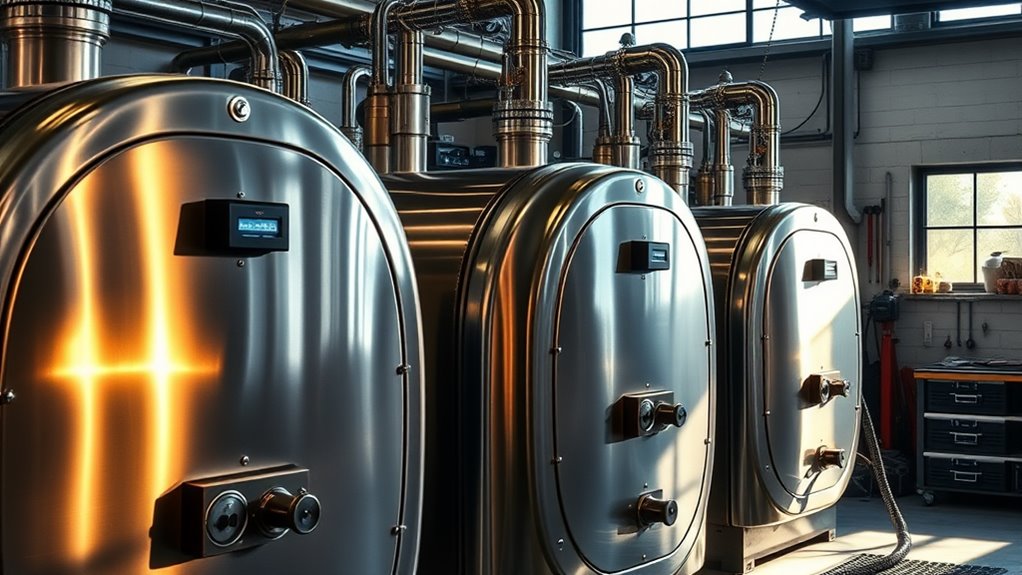
Durability is a crucial factor when choosing a boiler, as some models consistently outperform others regarding longevity. Among the top boiler brands known for their exceptional durability, you'll find Worcester Bosch, Vaillant, and Ideal. These manufacturers often receive high durability ratings from industry experts, reflecting their commitment to quality and robust construction.
Worcester Bosch's Greenstar series, for instance, is frequently lauded for its lifespan, often exceeding 15 years with proper care. Similarly, Vaillant's ecoTEC Plus models are designed for efficiency and long-term reliability. Ideal's Logic+ range also stands out, backed by strong warranties and positive user feedback. Investing in one of these durable options can provide peace of mind and long-term savings on replacement costs. Furthermore, regular maintenance is critical for peak boiler performance, ensuring these systems operate efficiently throughout their lifespan.
The Benefits of Regular Maintenance
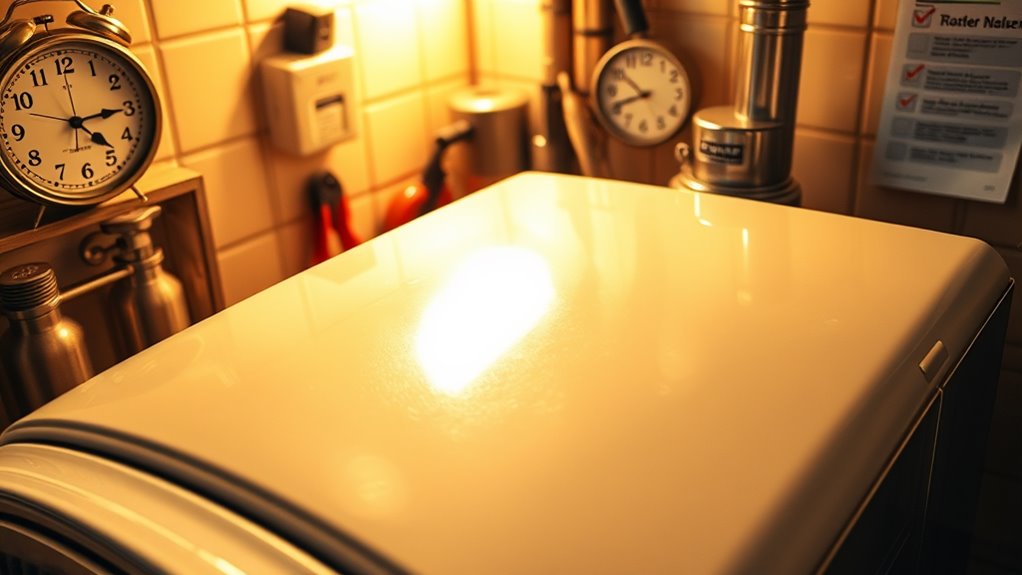
Regular maintenance of your boiler greatly enhances its efficiency levels, ensuring ideal performance. By adhering to a maintenance schedule, you also increase the lifespan of your unit, providing long-term reliability. Additionally, consistent care can lead to cost-effective repairs, ultimately saving you money in the long run. It is also crucial to consider the importance of regular maintenance for your heating system, as it helps prevent performance degradation and reduces the risk of breakdowns.
Enhanced Efficiency Levels
When you invest in regular maintenance for your boiler, you're not just ensuring its longevity; you're also enhancing its efficiency levels. Routine checks and servicing keep components clean and functioning effectively, which directly contributes to enhanced performance. A well-maintained boiler operates more efficiently, reducing the energy it consumes while delivering consistent heating. This leads to significant energy savings over time, as less fuel is wasted. Furthermore, addressing minor issues before they escalate can prevent costly repairs and downtime. By prioritizing maintenance, you're not only boosting your boiler's efficiency but also maximizing its output and reducing your overall energy bills. Ultimately, this proactive approach pays off both in performance and savings. Regular inspections are essential for maintaining ongoing compliance and safety, ensuring your boiler continues to operate at peak efficiency.
Increased Lifespan Assurance
By investing in routine maintenance, you can greatly increase your boiler's lifespan, guaranteeing it serves you well for years to come. Regular inspections and servicing help identify potential issues early, preventing costly breakdowns. This proactive approach not only enhances reliability but also guarantees your boiler operates within the parameters set during installation. High installation quality is essential, but ongoing maintenance is equally critical for long-term performance. Additionally, adhering to maintenance schedules can keep your warranty coverage intact, protecting your investment. You'll also benefit from improved efficiency and safety, which are paramount in any heating system. Fundamentally, a well-maintained boiler not only lasts longer but also delivers consistent comfort throughout its operational life. Regular checks for error codes can help pinpoint issues before they escalate into major repairs.
Cost-Effective Repairs
Routine maintenance not only boosts your boiler's lifespan but also greatly reduces repair costs over time. By conducting regular inspections, you can identify potential issues early, preventing costly breakdowns. A cost analysis of routine service shows that minor repairs are much cheaper than major ones. Employing effective repair techniques during maintenance, such as cleaning components and checking for leaks, guarantees efficient operation. These practices help maintain ideal performance and energy efficiency, reducing your utility bills. Additionally, regular upkeep can extend warranties, offering further financial protection. Ultimately, investing in consistent boiler care not only saves you money on repairs but also enhances your comfort and peace of mind, making it a wise decision for any homeowner. Furthermore, regular maintenance helps prevent error codes that can indicate serious malfunctions, ensuring your boiler operates smoothly.
Signs Your Boiler May Need Replacement
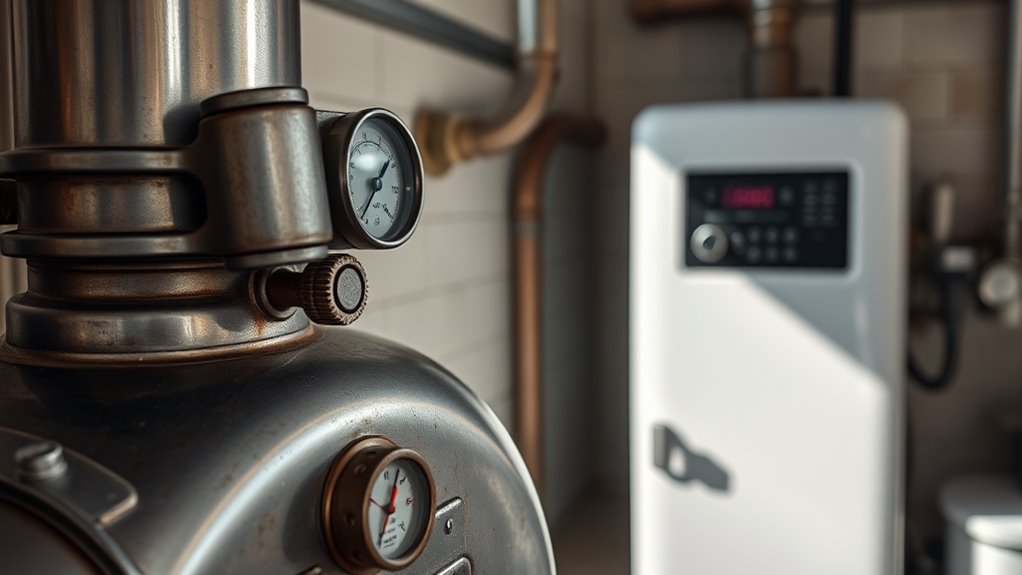
As your boiler ages, its efficiency can decline, leading to potential replacements. You should pay attention to any unusual noises coming from the unit and monitor your energy bills for unexpected increases. Recognizing these signs early can help you make informed decisions about your heating system. Additionally, if your boiler frequently displays E119 error code, it may indicate underlying issues that warrant consideration for replacement.
Age of Boiler
When your boiler approaches its typical lifespan of 10 to 15 years, it's crucial to recognize the signs that may indicate it needs replacement. Boiler lifespan statistics show that as units age, they're more susceptible to common boiler issues like leaks, reduced efficiency, and inconsistent heating. You might also notice an increase in your energy bills, which often signals that your boiler is struggling to operate efficiently. Additionally, frequent repairs can be a red flag; if you're spending more on maintenance than a new unit would cost, it's time to reflect on replacement. Regularly evaluating your boiler's condition can help you avoid unexpected breakdowns and guarantee your home remains comfortable. Don't wait until it fails; stay proactive about your boiler's age and performance. Low water pressure is a common issue that can emerge in aging boilers, further impacting their efficiency and reliability.
Unusual Noises Present
If you hear unusual noises coming from your boiler, it's a clear sign something may be wrong. Common unusual sounds, such as banging, clanking, or whistling, often indicate underlying issues that require immediate attention. These noises might result from air in the system, a failing pump, or sediment buildup in the heat exchanger. Effective boiler troubleshooting starts with identifying the source of these sounds. Ignoring them could lead to more significant problems, including complete system failure. Regular maintenance can help prevent these issues, but if the noises persist, it's wise to consult a professional. In some cases, these unusual sounds signal that your boiler may need replacement to guarantee efficient and safe operation. Addressing common error codes promptly ensures optimal boiler performance and longevity.
Increasing Energy Bills
Unusual noises from your boiler often indicate underlying issues, but another significant warning sign is a noticeable increase in your energy bills. If you've observed a steady rise in energy costs, it could mean your boiler is losing efficiency. This inefficiency often stems from age or wear and tear, leading to higher fuel consumption. As energy prices fluctuate, it's crucial to assess whether your boiler is contributing disproportionately to your monthly expenses. For effective budget planning, consider monitoring your energy usage closely. If your energy bills keep climbing despite no changes in usage, it might be time to evaluate your boiler's performance. Replacing it could ultimately save you money in the long run by reducing those escalating energy costs.
Energy Efficiency and Its Impact on Longevity
Energy efficiency plays an essential role in extending the lifespan of boilers, as it directly influences their operational stress and wear. High efficiency ratings mean your boiler consumes less energy, reducing the frequency of cycling on and off. This results in less thermal stress and strain on components, leading to fewer breakdowns. When you choose a boiler with superior energy consumption metrics, you're investing in a unit that not only performs better but also lasts longer. Additionally, efficient boilers typically operate at ideal temperatures, minimizing corrosion and other forms of deterioration. By prioritizing energy efficiency, you're not just saving on energy bills; you're also prolonging your boiler's life, ensuring reliable performance for years to come.
Tips for Extending Your Boiler's Life
To guarantee your boiler operates efficiently for years, regular maintenance is essential. Start by scheduling annual professional inspections to identify potential issues before they escalate. Ascertain proper boiler insulation to minimize heat loss, which can strain your system. Additionally, monitor water quality; hard water can lead to scale buildup, impairing efficiency and longevity. Consider installing a water softener if your area has hard water. Regularly check and replace the pressure relief valve to prevent leaks and maintain system integrity. Keep the area around your boiler clean and clear of obstructions, allowing for peak airflow. Finally, document maintenance activities, as this can help track performance and identify patterns over time, ultimately extending your boiler's lifespan.
Frequently Asked Questions
What Is the Average Cost of Replacing a Boiler?
When you're considering a boiler replacement, understanding the average costs is vital. Typically, boiler replacement costs range from $3,500 to $7,500, including installation expenses. Factors like the type of boiler, your home's size, and local labor rates can affect the total price. It's important to get multiple quotes and consider energy efficiency to maximize your investment. Planning ahead can help you avoid unexpected expenses down the line, ensuring a smoother changeover.
How Do I Choose the Right Boiler for My Home?
To choose the right boiler for your home, consider boiler efficiency and your heating needs. Start by evaluating your home's size and insulation. Look for models with high energy ratings to save on bills. Installation tips include guaranteeing proper venting and placement for peak performance. You should also check local regulations and consult a professional for sizing and installation advice. This guarantees your boiler operates efficiently and lasts longer.
Can a Boiler Be Repaired Instead of Replaced?
Yes, a boiler can often be repaired instead of replaced, especially if you've been diligent with boiler maintenance. Regular check-ups can catch issues early, minimizing repair costs. When deciding whether to repair or replace, consider the age of your boiler and the extent of the damage. If repairs are frequent and costly, replacement might be more economical in the long run. Always consult a qualified technician for a thorough evaluation.
What Are Common Boiler Brands to Avoid?
When considering common boiler brands to avoid, it's crucial to look into reliability and customer reviews. Brands with poor boiler maintenance tips or limited support might cause headaches down the line. Conducting a boiler warranty comparison can also reveal which models offer the best protection. Steer clear of those that consistently receive negative feedback regarding efficiency or durability. Investing in a reputable brand guarantees long-term satisfaction and fewer repair costs.
Does Boiler Size Affect Its Lifespan?
Yes, boiler size greatly affects its lifespan. An appropriately sized boiler operates more efficiently, reducing strain on components. If it's too large or small, it can lead to inconsistent heating and increased wear. Regular maintenance practices, like cleaning and checking for leaks, further enhance efficiency and longevity. So, make sure you choose the right size for your needs and commit to routine maintenance to maximize your boiler's lifespan.
Summary
In summary, choosing the right boiler and understanding its lifespan are essential for your home's efficiency. By considering factors like maintenance and energy efficiency, you can greatly extend your boiler's life. Regular upkeep not only enhances durability but also guarantees peak performance. Keep an eye out for signs of wear and be proactive about replacements when necessary. With the right care, you can enjoy reliable heating for years to come and minimize costly repairs in the future.

